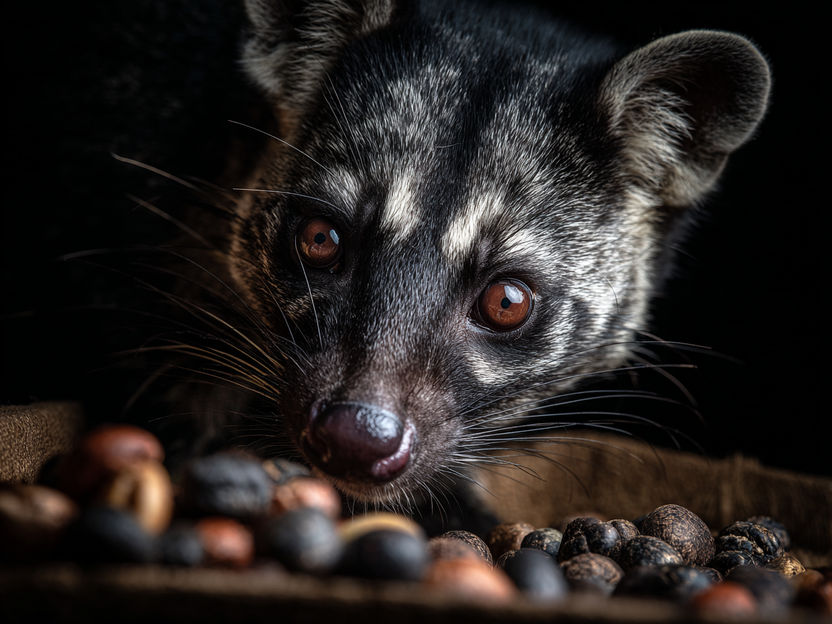The key to civet coffee is in the chemistry
coffee beans harvested from the faeces of the Asian palm civet (Paradoxurus hermaphroditus) may have higher levels of fats and other key flavour-enhancing compounds than traditionally harvested beans. The results, published in Scientific Reports, may help explain why this type of coffee is so prized.

Symbolic image
AI-generated image
Civet coffee, also known as kopi luwak, is one of the most expensive types of coffee in the world, and can sell for more than US $1,000 per kilogram of beans. The beans are harvested from the faecal matter of civets — usually Asian palm civets — which eat ripe coffee berries and digest the pulp whilst the beans inside pass through the digestive system. Although this type of coffee has been harvested and sold for over 100 years, there is still debate around whether the unusual harvesting method changes the coffee’s chemical composition.
Palatty Allesh Sinu and colleagues collected 68 faecal matter samples from wild civets on 5 estates growing Robusta coffee in Karnataka, India, in January 2025. They also collected ripe coffee berries from each estate for comparison. Samples of all bean groups were ground for chemical analysis after cleaning. The analysis shows that the civet beans had a significantly higher total fat content than the manually harvested beans. The civet beans also had significantly higher levels of two fatty acid methyl esters (FAMEs) — caprylic acid methyl ester, and capric acid methyl ester.
The authors suggest that the chemical differences in the civet coffee are a result of fermentation of the beans in the digestive system of the civets, and that the differences likely affect the coffee’s final flavour. They suggest that the higher fat content would affect the coffee’s aroma and taste profile, whilst the higher levels in the two FAMEs may add a dairy-like flavour. However, the authors caution that they analysed unroasted beans, and that the roasting process will further affect the beans’ chemical composition. They also note that they analysed Robusta beans, whilst most civet coffee is produced using Arabica beans.
Original publication
Most read news
Original publication
Ramit Mitra, Thomas Jose, P. Abhiram Krishnan, M. Hariraveendra, Palatty Allesh Sinu; "Civet Robusta and natural Robusta coffee are different on key fatty acid methyl esters and total fat"; Scientific Reports, Volume 15, 2025-10-23
Topics
Organizations
Other news from the department science

Get the food & beverage industry in your inbox
By submitting this form you agree that LUMITOS AG will send you the newsletter(s) selected above by email. Your data will not be passed on to third parties. Your data will be stored and processed in accordance with our data protection regulations. LUMITOS may contact you by email for the purpose of advertising or market and opinion surveys. You can revoke your consent at any time without giving reasons to LUMITOS AG, Ernst-Augustin-Str. 2, 12489 Berlin, Germany or by e-mail at revoke@lumitos.com with effect for the future. In addition, each email contains a link to unsubscribe from the corresponding newsletter.




























































